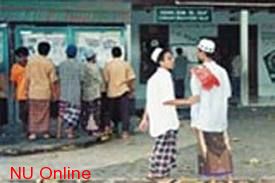Pesantren, Indonesian original Islamic education style
NU Online · Rabu, 14 Agustus 2013 | 01:45 WIB
Jakarta, NU Online
Islamic boarding school or locally called pesantren, is a popular system in Islamic education in Indonesia. Nowadays there have been many modern Islamic boarding schools growing rapidly by offering religious and general education in one packcage.<>
Based on data of the Ministry of Religious Affairs (2010-2011), there are some 27,218 pesantren spread across the country. The number of their students -called santris- reaches 3,642,738 people.
Many Indonesian Muslims who study in the Middle East countries then back to Indonesia and apply the teaching style here. According to an Islamic scholar Abdurrahman Mas'ud, the Islamic boarding school style was originally brought to Indonesia by Walisongo -refering to nine saints who lived in the 15th to 16th centuries in Java.
"Walisongo integrated religious and secular aspects in teaching Islam to society. Thus, it generated a unique educational institution," the professor in Islamic culture said.
Most 'pesantren' provide housing or dormitory living at low or no cost for the students (Santri). The two type of educations systems are conducted throughout the day.
Pesantren provide to Indonesian citizens at low cost; although today some modern pesantren charge higher fees than previously, they are still significantly cheaper than non-pesantren educational institutions. The traditional pattern was for students to work in the headmaster's rice fields in exchange for food, shelter, and education.
All pesantren are led by a group of teachers and religious leaders known as Kyai. . The Kyai is respected as teacher and devout man. Kyai also play important roles in the community as a religious leader and in recent years as a political figure. There are Kyai families that have a long history of serving in this role. Some contemporary Kyai are the grandsons and great-grandsons of famous historical figures who established well known pesantren.
They usually use a traditional system of learning. There are various techniques of teaching, but the most commonly used are bandongan and sorogan. Bandongan is a kind of religious instruction conducted by either the kiai or his senior santri. It is like a lecture attended by a large number of santri. In a big pesantren, such as the Pesantren Tebuireng, attendance at bandongan can vary from about 5 to 200 santri. Santri attendance does not depend on either their level of knowledge or their age. The system in this sense is just to provide the santri with regular daily learning, in which the kiai or senior santri read certain works written (in Arabic) by previous ‘ulama, translating it into local languages, and giving some explanation about it.
In a pesantren there should be some bandongan sessions which teach kitab at various levels, from the lowest to the highest. Such sessions reflect the standard of teaching in any single pesantren. As each session just discusses one section of the kitab, learning the entire kitab will take a couple of weeks or even months.
The bandongan system differs from the sorogan system. If in the bandongan, santri knowledge of grammar and Arabic language is assumed, the sessions are held for those who have already attained a basic understanding of the Arabic language and the Qur'an.
In contrast, sorogan is provided either for beginner santri or those who want to have more explanation of the problems discussed in the kitab. The sorogan session is usually attended by only two to five santri, and is provided by any senior santri who has knowledge and ability in certain subjects. This system aims to give special training to santri to assist them to develop certain knowledge and skills.
The pesantren in Indonesia has become a centre of learning and da‘wa. It has played an important role in Indonesia because it is the oldest system of learning and education. Before the modern education system was introduced by the Dutch, the pesantren was the only educational institution available in Indonesia. It should be noted of course that the pesantren in Indonesia still plays its role as an education center.
Editing by Sudarto Murtaufiq
Terpopuler
1
Panduan Shalat Gerhana Bulan Petang Ini, Mulai Niat hingga Salam
2
PBNU Instruksikan Qunut Nazilah Respons Agresi Israel-AS ke Iran
3
Jadwal Cuti Bersama dan WFA Lebaran 2026, Total Libur Capai 16 Hari
4
Gus Yahya Sebut Kepergian Ketum Fatayat Margaret adalah Kehilangan Besar bagi Keluarga NU
5
Ali Khamenei Wafat dalam Serangan Israel-Amerika
6
Ketua Umum PBNU Mengutuk Serangan AS-Israel atas Iran
Terkini
Lihat Semua
















